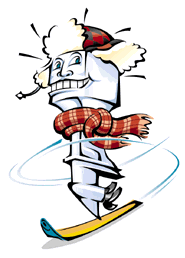 |
While some boaters wait until spring to tend to needed repairs, fall offers a great time (cooler weather) to take care of odds and ends. Besides the required winterization for your engine and boat, you may want to review the list below and take care of needed repair instead of waiting until next spring. |
Fall Maintenance Tips
Have your engine properly winterized to prevent freeze damage, or fuel deterioration or fuel phase separation problems. Refer to your owners or service manual for proper procedure for your engine. Basic steps include:
1.
adding a marine grade fuel stabilizer like StarBrite StarTon to your fuel system and run through
the engine.
2. fogging the engine with marine grade fogging fluid. Engines like the Evinrude E-Tec have an onboard auto-winterize feature.
3. draining all raw water from the engine, based on your particular engine type.
4. changing all fluids and filters.
5. lubricating all required points based on your type of unit.
Don't forget the head, hot water tank, holding tank, fresh water system, air conditioner, and generator should your boat be so equipped. These items need to be properly winterized to prevent freeze damage. Use of a non-toxic, non alcohol anti-freeze is required. Fresh water tanks need to be drained, holding tanks need to be pumped out, including porta potties.
Remove the drain plug from the boat and let any bilge water drain. Allow the boat to completely dry before storage. Put the drain plug in a zip lock bag and attach it to the steering wheel so you don't loose it or forget to install it in the spring.
Make sure all storage compartments, wells, and live wells are drained. You may want to consider using a nontoxic propylene glycol antifreeze to flush all drains to prevent freeze damage.
Check the entire fuel system, hoses and fittings for loose or broken clamp, leaks, or deterioration.
Replace any damaged or broken hardware on your boat.
Inspect the condition of your propeller. Have it repaired or replaced as needed.
Store any electronics or digital devices in the house and not in the boat. And besides, you may want to use them at home or in the car.
A good cleaning will prevent delays in the spring should weather be less than desirable in March or April.
Remove any wet items from you boat such as ropes, life jackets, fishing tackle, ski equipment and other items. You may want to consider storing these items out of your boat for the winter so they can dry out instead of collecting mildew and mold.
With service facilities not as busy now, you may want to consider any cosmetic repairs needed to your boat.
If you have sterndrive power, when was the last time you had the outdrive pulled and serviced. You may want to consider having that done.
Make sure all batteries are disconnected for winter storage. If you remove the batteries, be sure to place them on a piece of wood. Storing them with contact to a paved floor will cause them to loose charge capacity. Be sure to tie tab groups of wiress together and mark them if you have twin batteries so they get connected correctly next season.
If your battery needs to be replaced, you may want to wait until spring to install a fresh new battery. Remember, Knapik's Marine does free load tests on marine batteries if you bring your battery in.
Remove electronics such as the depth finder, GPS, or any other equipment. Standard liquid filled compasses will be OK left in the boat.
Don't forget your trailer. Motor Vehicle laws require that you have your trailer inspected once a year.
Check the condition of your tire sidewalls and check for proper tread wear.
If your trailer has brakes, be sure to check the brake fluid, and have your brakes checked for proper operation.
Wheel bearings can be easily checked by jacking up each wheel and giving the tire a spin. A growling noise is usually a sign of trouble that needs to be taken care of.
If your trailer has greasable hubs, be sure to lube them according to instructions before putting the boat into storage. If not, have the bearings re-packed now to prevent further rust damage from occurring during the winter.
And finally, just practice a little common sense. Do a thorough inspection of your boat, engine and trailer if you have one, and take care of any problems you may see. If not sure or familiar with such maintenance, you may want to seek the services of your local boating service center.
518-842-8140
Need help? Use the E-mail link below to send us your questions.